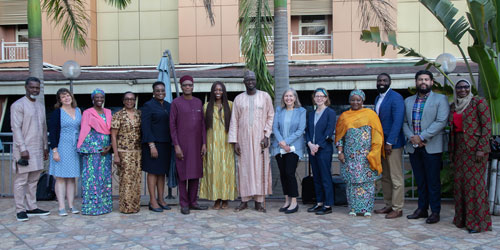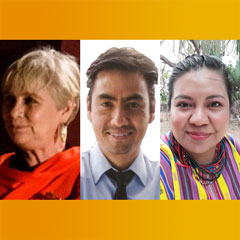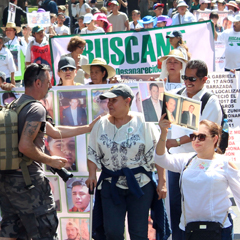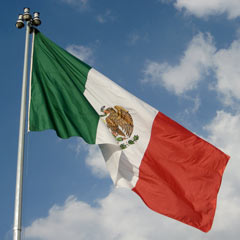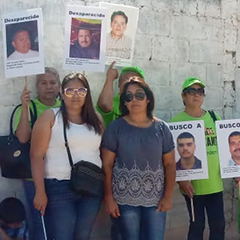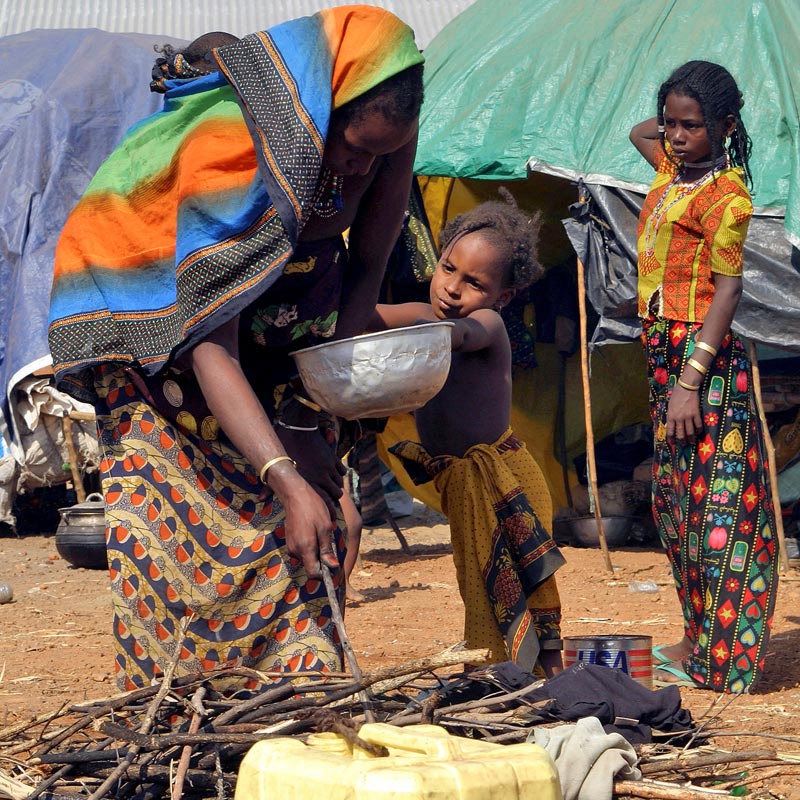Fifty-nine years ago today, with the enormity of the Holocaust haunting the world’s collective conscience, the United Nations adopted the Universal Declaration of Human Rights. It stated that “recognition of the inherent dignity and … inalienable rights of all members of the human family is the foundation of freedom, justice and peace in the world.” It was the first global proclamation of human rights – an occasion we observe every December 10, International Human Rights Day.
The Declaration was one of several steps taken to establish a new standard: that crimes against civilians, the extermination of ethnic groups, and acts of torture were inexcusable – even when following orders in times of war. The world appeared well on its way to fulfilling its promise of “Never again.”
Time would tell otherwise. In the past 20 years alone, we have witnessed ethnic cleansing in the former Yugoslavia and genocide in Rwanda and Darfur. Elsewhere we have seen systematic human rights abuses, acts of torture, and other affronts to our ideals of humanity go unpunished by national judicial systems. Even though journalists, working in dangerous conditions, have bravely exposed these abuses, atrocities continued.
But there is hope for a better future. A system of international justice is emerging and growing stronger with each new case tried in a regional court and each new investigation opened by the International Criminal Court, the ICC. The two-key words are “emerging” and “system.” I want to talk with you today about how three key parts of the system – the new ICC; regional human rights courts and commissions; and a new norm on the responsibility to protect – are all coming together to send a powerful message: the age of impunity is coming to an end. Those in the future who would contemplate committing crimes against humanity face a higher probability of being held to account. But there is work ahead to forge a real system of international justice from the tools available. And there needs to be an honest discussion about what role the US should be playing.
MacArthur’s work in international justice is a case study of how a large multi-purpose foundation works.
I welcome questions after my speech about any of MacArthur’s programs. We give away about $260 million each year, which puts us in the top ten of US foundations; and fourth largest in international grantmaking. We are widely known for the genius grants and our support for public radio and television, but we do much more, both in the United States and in 60 countries abroad. Our mission is clear: we seek a more just, sustainable, and peaceful world. We work toward this end with a faith in the power of global civil society, expressed in our support for many nongovernmental organizations, groups that undertake important work that governments cannot or will not initiate themselves.
Our topic today, international justice, is a good illustration of our mission at work. Our very first grant in 1978 went to Amnesty International, followed by $300 million in support to nearly 600 other organizations in human rights and international justice.
Most of us believe that justice is best advanced when crimes are prosecuted where they are committed. But history is replete with examples of nations unable or unwilling to prosecute human rights abuses. In these instances, justice must come from beyond national borders. And let me be clear: international justice is not only about preventing genocide but also about protecting ordinary citizens against police abuse and discrimination, and encouraging free speech and assembly.
The notion of a system of international justice is not new. The modern movement has its roots in the first Geneva Convention of 1864, which dealt with the treatment of wounded combatants. The subsequent Conventions set an enduring standard for minimally acceptable conduct in times of war.
At the end of World War I, a commission on war crimes concluded that there was a need to punish those “however high their position…who had been guilty of offences against…the laws of humanity.” Enforcement, however, proved impossible. Accused persons were not surrendered to the Court. Kaiser Wilhelm, who was singled out for his offences, ended his days chopping firewood in the sanctuary of the Netherlands.
Between the wars, there was little further progress. But from the ashes and rubble of World War II arose a phoenix of hope. The Tribunals in Nuremberg and Tokyo put Nazi and Japanese Imperial officials on trial in proceedings that clearly established their guilt and imposed sentences in full public view. Individuals in positions of responsibility were held accountable for their criminal behavior. After the war, the UN made a series of attempts to establish a permanent international criminal court, but each foundered on the shoals of Cold War disputes.
In the early 1990s, there was renewed interest in international criminal jurisprudence. The UN once more took steps to establish a permanent court. And events in the former Yugoslavia and Rwanda gave new urgency to the process. The Security Council established ad hoc criminal tribunals in 1993 and 1994 to try the government officials behind those atrocities. Slobodan Milosovic of Serbia was the first sitting head of state ever indicted, and Jean Kambanda, former prime minister of Rwanda, faced charges of genocide and pled guilty. With trials and appeals continuing, 239 people have been indicted and 78 convicted so far.
Other national leaders have also discovered that their status no longer confers immunity from prosecution. Augusto Pinochet, former president of Chile, was arrested in Britain under the theory of universal jurisdiction, then allowed to return to Chile, where he died facing 300 criminal charges. Charles Taylor, former president of Liberia, is now before a tribunal in The Hague to answer for his alleged crimes against humanity in neighboring Sierra Leone. Five leaders of the Khmer Rouge have been arrested and are awaiting the start of their trial before a tribunal in Cambodia. Chile’s Supreme Court has extradited Alberto Fujimori, former president of Peru, to face charges in Peru. And there is a reasonable chance that Hisséne Habré of Chad may be brought to justice in a Sengelese Court.
As cases mount, the world moves closer to ensuring accountability for gross human rights abusers. The next step is to make the International Criminal Court a success, so that, as a permanent institution, it will become a credible deterrent to those who might consider crimes against humanity in the future.
The Court was established by the Treaty of Rome in 1998. Its jurisdiction began in 2002, with ratification by the requisite 60 countries. To date, 105 states have ratified, but alas not the United States.
The Court’s chief purpose is to be a permanent and independent court to prosecute the most serious crimes against humanity. Based in The Hague, the ICC has jurisdiction over acts committed on the territory of a state party to the Statute, and acts committed by the nationals of a state party. Also, the UN Security Council may refer a situation to the Court, regardless of the nationality of the accused or the location of their crimes.
The ICC is a court of last resort. It operates under the principle of complementarity, which the United States helped embed in the Court’s charter document. The Court only has jurisdiction when national courts are unable or unwilling to act. All member nations retain the primary right and responsibility to investigate their own citizens accused of crimes against humanity.
The Court issued its first warrants in 2005 for Joseph Kony, leader of the Lord’s Resistance Army in Uganda, and four of his subordinates, and later against Thomas Lubanga, leader of the UPF militia in the Democratic Republic of the Congo. Both are implicated in the murder and torture of civilians, and the kidnapping of children for use as soldiers. Lubanga was brought into custody late last year, and is awaiting the start of his trial in March. He was recently joined in ICC custody by Germain Katanga, the leader of a separate Congolese rebel group, who is accused of orchestrating an attack that resulted in the death of 200 civilians and the sexual enslavement of women and girls.
In April of this year, the Court issued arrest warrants for Ahmad Mohammad Haroun and for Ali Muhammad Ali Abd-Al-Raman (also called Ali Kushayb). They are accused of collaborating in the forced displacement of ethnically African people in the Darfur region of Sudan, and of a mass campaign of terror that included aerial bombing, abduction, rape, and murder.
However, their warrants remain unfilled as the Sudanese government, has no incentive to turn them over. Indeed, Haroun now serves as Minister of Humanitarian Affairs and has been appointed to co-chair a committee designated to hear complaints from victims of human rights abuses in Darfur.
These cases – and that of Joseph Kony, who also remains at large – raise an important question: Who is responsible for enforcing the ICC's arrest warrants? To fulfill the Court’s promise as a permanent venue to try crimes against humanity and a strong deterrent of future evildoers, the international community must enforce the Court’s warrants.
With that said we are beginning to see examples of the Court’s deterrence power. In late 2004, tensions flared in Cote d'Ivoire, fueled by radio broadcasts of hate speech and violent groups in the streets, reminiscent of hate speech that preceded the Rwanda genocide. In response, Juan Mendez, a UN advisor on genocide, wrote the Security Council a widely-publicized note that reminded them that the ICC has jurisdiction over acts, such as hate speech, that lead to crimes against humanity. The message was received in Cote d'Ivoire: the hate speech and the immediate threat of violence subsided.
But there is no question that there is more to do to get the Court off to an effective start. The Court needs help gathering evidence, explaining its work in situation countries, training staff and much more. So far, MacArthur has supported the Court directly in these efforts and 29 NGOs helping the Court.
Global Rights, Human Rights Watch, and the International Federation for Human Rights gathered evidence to prepare the first cases. The Ugandan Coalition for the ICC is educating the public about the Court. Redress, Avocats Sans Frontiéres, and the Women’s Initiative for Gender Justice are working with victims and witnesses. The International Bar Association is providing independent analysis of the Court’s proceedings. And Alliances for Africa is helping signatory states bring their laws up to international standards. So far, Mali, South Africa, Estonia, Armenia and some 40 countries around the world have changed their own laws in response to the existence of the Court. For example, Mali changed its criminal code to match the crimes under the ICC statute.
The US and International Justice
The absence of the United States from the ICC’s membership rolls is a low mark in an otherwise noble history of leadership in international justice. The US was one of the architects of the Nuremberg and Tokyo tribunals, and it has been an active supporter of the tribunals for the former Yugoslavia, Rwanda, and Sierra Leone. Still, the US has balked at joining the ICC. President Clinton signed the Treaty of Rome on December 31, 2000, but did not send it to the Senate for ratification. And President Bush has made his opposition clear. The Court’s opponents in the US fear that membership in the ICC would expose Americans to politically-motivated cases and some say that the ICC falls short on due-process protections. But these fears have not materialized and are not likely to, as the Court procedures have all the same protections as US courts, except trial by jury. And all charges involving Americans have been rejected.
There is some reason to hope that the US will overcome these concerns and eventually join the ICC. Over the past two years, both Congress and the Administration have softened their opposition to the Court. In March 2005, the Bush Administration allowed the UN to refer the situation in Darfur to the ICC.
Perhaps lawmakers in Washington have realized that most Americans recognize the value of the Court and would prefer to see the US participate – some 71%, according to a survey by the Chicago Council on Global Affairs funded by MacArthur.
While the Court is making its way without the United States, it would be strognger if the US were a member. The American legal system and expertise has much to contribute to the early cases which will shape the Court's jurisprudence for the future. And American intelligence agencies could help the Court gather evidence to ensure successful prosecutions.
In this campaign season, the public has the right to know where all the leading candidates stand on the issue. Yet they have been largely silent. I have not heard any extensive discussion of the Court in the debates. So I ask all the candidates these questions: If you were elected President would you ask the Senate to ratify the Rome Statute? While that process unfolds, would you support the Court’s work? Would you press Sudan to turn over Haroun? Would you be an American leader that advances international justice?
Affirmative answers to these questions would strengthen the Court and send a powerful signal that the US wants to re-engage with the rest of the world.
So far we have been talking about high-profile cases of crimes against humanity. But the system of international justice also provides venues for ordinary people when they have exhausted remedies in their own countries. The regional courts in Europe, Latin America, and Africa are these places, and MacArthur has been supporting local human rights groups to bring precedent setting cases to them.
Here are two examples of how the courts work: One of our grantees in Russia, the Nizhii Novgorod Committee Against Torture, took the case of Alexei Mikheyev to the European Court. Mikheyev had been accused of raping and murdering a local girl. While in police custody, he was brutally tortured and leapt from a fourth-floor window to escape. He was paralyzed in the fall, while his supposed victim later turned up unharmed. The Court ruled against Russia and awarded damages of $305,000 to Mikheyev.
A grantee in Mexico, the Comisión Mexicana, won a settlement from Mexico City by threatening to take a case before the Inter-American Commission and Court on Human Rights. The case concerned Alejandro Ortiz Ramirez, who accused the police of having tortured him. Mexico City made a public acknowledgement of wrongdoing, granted Ramirez employment and housing, and changed its municipal laws to preclude evidence extracted under torture.
All told there are almost 80,000 cases from 70 countries pending before regional human rights courts and commissions. A significant number of these cases result in decisions that compel countries to respect their own constitutions and abide by treaties they have signed.
Most international attention focuses on bringing the world’s worst actors to justice. We hope the ICC will deter, but it will not be one hundred percent effective. Whose responsibility is it to step in when genocides and other atrocities are in the making?
To address that issue, MacArthur supported the International Commission on Intervention and State Sovereignty, organized by Canada in 2001, which produced a path-breaking report titled, The Responsibility to Protect.
The report calls for a new norm in world affairs: if states fail to protect their citizens against gross human rights abuses or genocide, the international community has a responsibility to intervene. The preferred venue to organize life-saving intervention is the UN Security Council, but when the UN fails to act, the report sees a role for regional organizations like NATO or the African Union, and even for coalitions of willing nations.
The Responsibility to Protect was adopted by the UN at the World Summit in 2005, and MacArthur is funding the International Crisis Group and others to promote understanding and support of the Responsibility to Protect around the world.
Together, the Responsibility to Protect, the ICC, and regional human rights courts make it possible that the 21st Century will see the end of the era of impunity and the dawn of the age of accountability.
This vision is still a work in progress, but one that is advanced by many courageous and determined individuals. The MacArthur Foundation believes it is time to recognize those who lead the movement; those who call humankind to create a world in which every individual enjoys both security and opportunity. It is time to recognize those who carry on the spirit of Gustave Moynier, the co-founder of the International Red Cross who issued one of the first calls for an international court; and the spirit of Raphael Lemkin, the Polish lawyer who coined the word genocide and petitioned the League of Nations to ban crimes against humanity; and the spirit of Justice Robert H. Jackson, the chief prosecutor at the Nuremburg Trials.
To honor the modern day leaders of the movement, I am pleased to announce today that the MacArthur Foundation has created the MacArthur Award for International Justice. The Award honors an individual or an organization that advances the cause of international justice – it could be a world leader, a courageous judge, or ordinary citizens working through a human rights group. Because the first honoree will help define the award, we wanted to recognize a person whose life's work embodies the values of justice but also of the hope for a decent, humane, peaceful world that justice makes possible.
We asked ourselves: Who issued the charge to the Rome Conference that gave rise to the ICC? Who encouraged the development of the Responsibility to Protect? Who challenged the world to set the Millennium Development Goals so that justice is an everyday opportunity for ordinary people? The answer: Kofi Annan, the former Secretary General of the United Nations. No one has done more to frame a vision of a more just, sustainable, and peaceful world.
His perspective on peace and security placed protection of individuals at the center of the world’s concerns. His 2005 report, In Larger Freedom, and the World Summit that followed strengthened the world’s commitment to the rule of law. A reorganized Human Rights Council, a Peacebuilding Commission, and a new Rule of Law Assistance Unit hold promise for the future.
Hear his vision:
• In his Nobel lecture, he said, “A genocide begins with the killing of one man – not for what he has done, but because of who he is. Poverty begins when even one child is denied his or her fundamental right to education. What begins with the failure to uphold the dignity of one life, all too often ends with a calamity for entire nations.”
• And in a letter to the drafters of the Treaty or Rome, he wrote, “The overriding interest must be that of the victims, and of the international community as a whole. The Court must be an instrument of justice, not expedience. It must demonstrate that an international conscience is a reality.”



